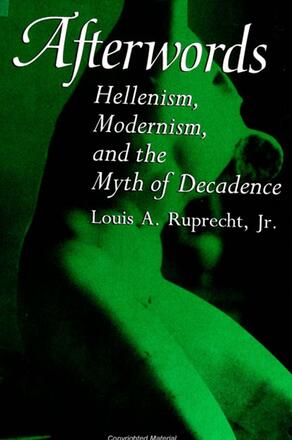
Afterwords
Hellenism, Modernism, and the Myth of Decadence
Alternative formats available from:
Reading both philosophical and theological texts, this book presents an argument against nostalgia: against the myth of a Golden Age, against the posture that sees "modernity" as a problem to be solved.
Description
This book about nostalgia raises the question of why it has become such a dominant and influential posture in contemporary philosophical and theological writing. The author notes the presence of the word "after" in a great many contemporary academic titles, and notes a spiritual sort of alienation that many feel in the "modern age." Out of this scholarly discontent emerges one of two related attempts: the attempt to return to a pre-modern manner of thinking and being (nostalgia); and the playful flight into some vaguely defined "postmodernity" (utopia). In either case, the common perception is that modernity is a problem, a problem to be avoided or escaped.
Bringing philosophical and theological texts into conversation with one another, the book discovers a startling similarity in the accounts of modernness offered in these disparate idioms. Both are telling a story—a story which, the author argues, is as seductive as it is misguided.
Louis A. Ruprecht, Jr. is Visiting Professor, Department of Religion, Emory University
Reviews
"The fundamental argument is a badly needed correction to the uncritical use of periodization in contemporary critical, philosophical, ethical, theological, and general cultural discourse. The specific periodization in question is the set of distinctions between 'modern,' 'premodern,' 'postmodern,' 'classical,' and 'Biblical' moments in the history of thought and ideas. The book represents a frontal assault upon the positions generated by several key contemporary writers (MacIntyre, Stout, Taylor in philosophy and ethics; Hauerwas in theology) who allegedly rely upon these distinctions. There is an extraordinarily effective analysis of Nietzsche in this connection, using Wir Philologen, a previously untranslated manuscript. This part is one of the high moments in the book. The author also has an unimpeachable command of Homer, Plato, Aristotle, Pauline theology, and the Greek tragedians. He's one of that endangered species, the Christian classicist. The book is written with wit, passion, a great wealth of allusion and learning. Outstanding." — Ralph V. Norman, Jr.
"The topic is at the heart of much contemporary debate about the relation of philosophy to religion and the role of religious faith not only in the academy but in Euro-American society at large. No one has gotten a clearer bead on these issues than the author. I emphatically recommend this book." — Bruce Lawrence, Duke University